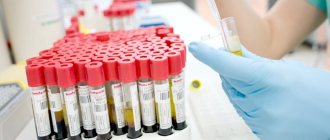In the body of every person there is and functions a very important gland of the endocrine system - the pituitary gland. But few people know that this gland produces the most important hormone in the body - prolactin.
Prolactin is a polypeptide hormone produced by the secretion of the brain myometrium and mammary gland in women. The hormones testosterone, estradiol, and progesterone are also produced in a woman’s body.
The hormone Prolactin and its role in the woman’s body
This hormone is present in both men and women, but in the latter it plays a huge role in the conception and bearing of a child.
In the female body, prolactin performs many biological functions:
- affects the general condition of the reproductive system;
- the onset of pregnancy and its further development;
- in the development of the postpartum process;
- producing the required amount of milk for the baby;
- controls the manifestation of the menstrual cycle, its appearance, course and regularity. This process occurs due to the interaction of prolactin with other hormones of the female body responsible for the above process.
A certain amount of prolactin is produced in the endometrium of the uterus. The hormone prolactin is responsible for the growth of a woman's breasts, the development of her mammary glands and the subsequent production of milk when feeding a child.
The significance is expressed in the need for the hormone:
- to restore the normal functioning of the ovaries and follicles;
- the appearance of ovulation in a woman;
- for the proper functioning of such a process as the maturation of the corpus luteum and the process of its disappearance;
- to maintain the norm between the hormones estrogen and LH (luteinizing hormone)
If you still do not know the level of prolactin in your body (both men and women), before taking this blood test, you must first consult with a specialist; only a doctor can prescribe this test for you. Perhaps, thanks to its results, you will be able to find the cause of your body’s ailments.
Decoding
You usually have to wait no more than 24 hours for the result of a prolactin test. The decoding should be done exclusively by a doctor, since only a specialist with certain knowledge can interpret the results. In this case, the results obtained are compared with a table of average indicators.
Norm of prolactin in women and men in honey/ml: table
| From 0 to a month | From a month to a year | After a year | |
| Women | 65-1990 | 620 | 100-550 |
| Men | 75-1706 | 603 | 70-403 |
During the study, doctors also evaluate the patient's progesterone. This indicator gradually increases from the beginning of the cycle and increases to its maximum at the onset of ovulation. In the absence of pregnancy, it begins to decline. During ovulation, levels reach values from 0.45 to 9.44 ng/ml, and at the end of the menstrual cycle approximately 0.30-9.39 ng/ml.
You might be interested in: 11 weeks of pregnancy: fetal development
Forms of prolactin
The hormone prolactin is found in human blood in several molecular forms.
Here are the ones described by experts:
- Native or monomeric prolactin. In the blood it is found in a ratio of 85%. This form is distinguished by its excessive activity. The structure of monomeric prolactin consists of amino acids (199) and disulfide bridges (3). The implementation and control of prolactin synthesis is helped by a gene located on chromosome 6 of the human body.
- “Big-Big prolactin” This form is distinguished by its large scale, but its activity is the least compared to the previous one and is 10% dimer. The difference is that this form is immunoreactive. The presence of such a ratio in a woman’s blood indicates the regularity of her menstrual cycle.
- Forms are isolated, such as glycosylated and prolactin-like peptides , the former have less immunoreactivity, and the role of the latter is being studied by specialists at this stage.
Preparation for the procedure
The procedure requires serious physical and psychological preparation:
- 24 hours before blood sampling, all factors from the physiological group of reasons for increasing the concentration of the substance are excluded;
- the last meal before donating blood occurs 8 hours before and contains a minimal amount of protein;
- It is not recommended to take medications without first consulting a doctor (any foreign substances in the blood may affect the reliability of the result).
Indications for prescribing a prolactin test
Most often, the owner of the fairer sex of the population receives an appointment from a doctor to take a test for hormones (prolactin), if he doubts the normal functioning of a woman’s hormonal levels during pregnancy planning.
Features in prescribing blood donation for prolactin are:
- If a girl complains of an irregular menstrual cycle;
- Unsuccessful attempts to conceive a child accompanied by miscarriage;
- Suspicion of lack of ovulation (infertility);
- Women at risk of developing anorexia or being overweight;
- Manifesting disease of the mammary glands;
- Presence of formations in the form of acne;
- Problems with normal kidney function;
- Excessive amount of body hair.
Girls who are already carrying a fetus also donate blood for prolactin; the doctor prescribes this test if there is a concern that the child will develop pathologies.
Long before planning a pregnancy, a woman must take care of her health and the health of her unborn baby, and pass the entire list of hormone tests.
Preparing for a prolactin test
If a woman decides to find out the level of the hormone prolactin in her body, then she must donate blood from a vein. This must be done in the first or second phase of the menstrual cycle. If the doctor has not prescribed special instructions, the girl can donate blood from the 1st to the 3rd day of menstruation.
But to get an accurate result, you need preparation and a few rules before taking the analysis:
- You must take the test strictly on an empty stomach. It is better to prepare and still spend a few hours after waking up at home;
- The day before donating blood, do not have sexual relations with your partner;
- Avoid visiting the sauna;
- Eliminate alcohol;
- Protect yourself from possible stress;
- Do not have any effect on the mammary glands.
Experts advise stopping smoking several hours before taking blood, and resting and calming down for at least 30 minutes before donating.
On what day of the cycle is the test done?
A girl’s hormonal background is responsible for both the internal and external state of any woman.
It is known that the content of the hormone in question depends on many factors that have already been mentioned above, and also depends on the day of the menstrual cycle.
In this regard, some experts argue that you can donate blood for analysis on any day of the menstrual cycle.
In this case, the result will be deciphered taking into account the day and phase of the menstrual cycle.
However, there are some difficulties. For example, in women, the length of the menstrual cycle may vary, which affects the accuracy of determining the acceptable range of prolactin in the blood.
Doctors recommend donating blood for a prolactin level test on days 3-5 after the start of menstruation, or on days 23-26, provided that the menstrual cycle should be regular and equal to approximately 29 days.
Otherwise, the doctor must set a different time for testing for hormone concentrations, taking into account the individual characteristics of the woman.
YouTube Embed: The maximum URL length has been exceeded. Please reduce your parameter and/or playlist.
Diseases and pathologies in which prolactin is reduced
The causes of diseases in which a decrease in prolactin levels is expressed are varied. It could even be an incorrect diet.
Other reasons may be:
- detection of brain tumors;
- detection of tuberculosis bacillus in the body;
- cranial injuries with brain damage;
- bleeding during childbirth;
- taking contraceptives;
- diabetes not classified as diabetes mellitus;
- inflammation or detection of ovarian tumors;
- unhealthy diet accompanied by fasting;
- stress and depression;
What diseases can be detected?
The patient needs to donate blood for prolactin as prescribed by a gynecologist or endocrinologist. Using this study, it is possible to suspect the following diseases:
- Disturbance of hormone levels due to stress.
- Infertility in a woman.
- Mastitis.
- Galactorrhea.
- Mastopathy.
- Pituitary gland diseases.
- Impaired functioning of the hypothalamus.
- Menstrual cycle disturbances and others.
We must not forget that the concentration of prolactin can decrease or increase under the influence of external provoking factors. Fluctuations in the level of the substance occur during increased physical activity, during eating disorders, during stressful shocks, when achieving orgasm, after pregnancy, and while taking certain medications. If these factors are excluded, the cause of changes in hormone levels should be sought in internal disorders in the patient.
Prolactin during pregnancy and lactation
Having pleased herself and her husband with the news of a speedy addition to the family, any woman runs to see a gynecologist.
Often, the first thing she hears at an appointment is a prolactin test.
The female body is so diverse and complex at the same time, because one organism can give the world several lives.
The woman’s hormonal background is responsible for the successful course of pregnancy, proper gestation and subsequent lactation.
But not everyone has such happiness; many suffer from infertility and struggle with this diagnosis, and a prerequisite is that for one or the other woman it is worth taking a prolactin test.
The hormone is responsible for the entire process from conception to childbirth, as well as the production of milk in the mammary glands, and the regulation of water-salt balance in the body.
Prolactin in a pregnant woman’s body is not always normal; its increase may indicate a brain tumor, which fortunately is benign (pituitary microadenoma). It can also be a symptom of infertility (failure to ovulate).
In any case, this issue of increasing prolactin and pregnancy requires careful analysis.
There are also cases when, after childbirth, due to illness of the mother or child, it is necessary to reduce the level of prolactin in the blood. This can be done in the safest way for the mother thanks to medications.
A nursing mother needs:
- Conduct a mandatory consultation with a gynecologist. He will select the most effective drug;
- Wean your baby off the breast completely;
- Start using the drug , protecting the mammary glands from any influence.
Who should take it?
A prolactin test is mandatory for women in cases of pathological conditions such as infertility, breast diseases, and autoimmune diseases. The study helps to find out the causes of certain deviations and select the necessary treatment. In addition, the analysis makes it possible to confirm diagnoses such as pituitary dysfunction, deficiency of certain vitamins in the body, liver cirrhosis, and more.
Indications for a blood test for prolactin are the following conditions:
- Menstrual irregularities.
- Lack or small amount of milk from the mother during breastfeeding.
- Suspicion of mastopathy, the patient develops headaches and vision problems.
- Discharge from the breast in the absence of pregnancy.
- Sharp weight loss or, conversely, rapid weight gain.
- Breast enlargement and breast tenderness.
- Decreased sexual desire.
- Delayed puberty in girls.
- Delay or complete absence of menstruation.
- Prolonged pregnancy.
- Suffering miscarriages.
- Male hair growth.
- Difficult menopause.
You might be interested in: How contractions are displayed on CTG
It is also recommended to take the test if there are frequent jumps in blood pressure, if there are causeless fainting and dizziness, if the girl suffers from insomnia and frequent mood swings.
If a woman has difficulty conceiving, she needs to be tested simultaneously for prolactin and progesterone, since these two substances are closely interrelated during pregnancy.
How to maintain normal prolactin levels?
In order to prevent any deviations, you need to listen to a number of tips:
- Be sure to visit a gynecologist at least once a year and get tested for a number of hormones;
- If the above symptoms occur, immediately consult a doctor for a subsequent prolactin test;
- that affect the course of pregnancy more than half a year in advance
- When carrying a fetus, conduct constant monitoring with a specialist;
- When problems arise, always remain calm , the level of real medicine works wonders.
Causes of low or elevated mammotropin levels
An increase in prolactin levels or, conversely, a decrease in it often indicates certain problems in the body. In the table we consider diseases that cause fluctuations in the level of mammotropin.
| Short | High |
| Prolonged pregnancy | Polycystic ovary syndrome |
| Oncological formations in the brain area | Pathologies of the pituitary gland |
| Treatment with anticonvulsants | Kidney diseases |
| Tuberculosis | Transferring treatment with hormones |
| Transferring radiation therapy | Thyroid dysfunction |
| Skull and brain injuries | Anorexia due to nerves |
| Apoplexy due to hemorrhage | Hypoglycemia |
A doctor should decipher blood results for prolactin. The doctor evaluates the results in conjunction with other data obtained during a comprehensive examination. We must not forget that the results can be distorted by such conditions in the patient as severe fatigue, psychological stress, severe anxiety, etc. In this regard, you need to donate blood when you feel well.
Hormone production and types
First, let's figure out what prolactin is. This is a lactogenic hormone that is produced by acidophilic cells of the anterior pituitary lobe. This is a peptide hormone related to prolactin-like proteins. This group includes:
- placental lactogen;
- prolactin;
- stomatotropin;
- proliferin.
When describing the PRL hormone and what it is, it is worth saying that its effects are somehow related to reproductive function. The target organ for this hormone is the mammary glands. There are 4 isoforms of prolactin that circulate in the blood:
- Small isoform (MW 22000) – it has the highest biological activity.
- Large PRL (MM 50000).
- Very large isoform (MM100000).
- Glycolysed PRL (MW 25000).
Important! All forms of prolactin have the same immunogenicity. The second and third forms are more often found in patients with pituitary adenoma.
Prolactin in men is secreted by lactotrophic pituitary cells. The immune and nervous systems are also involved in its secretion. The production of the hormone by the pituitary gland depends on the regulatory activity of the hypothalamus.
Reasons for increased prolactin production:
Erosion on the penis: causes, symptoms and treatment
- depressive states;
- severe pain;
- Stress can increase PRL concentrations in men;
- anxiety;
- psychoses;
- the content increases against the background of drug and alcohol abuse;
- Psychotropic drugs, tranquilizers, and antidepressants affect the production of PRL.
How the procedure and interpretation of the analysis is carried out
The procedure involves drawing blood from a vein. Duration - no more than seven minutes. All manipulations are painless. A special syringe is used to draw blood, then a cotton swab treated with alcohol is applied to the puncture site.
To avoid the appearance of a hematoma under the skin, you need to keep your arm bent for several minutes.
The biological material is marked and then sent for research. Whey is extracted from it; two methods are used for this:
- Rolling method;
- Sedimentation method.
Summarizing
In men, deviations from the norm of prolactin are a rare occurrence; women are more often subject to hormonal fluctuations . Moreover, prolactin has one peculiarity - a large variation in normal values. Patients who had to take a hormone test on the desired day of the cycle often ask the doctor what reasons contributed to the decrease or increase in hormonal levels. For an accurate diagnosis, not only the prolactin level is important, but also what symptoms accompany the patient.
If a woman whose hormonal level was examined in the first phase of the menstrual cycle has an increased or decreased hormone level, it is advisable to take the hormonogram again - after 1-2 weeks (on another day of the cycle, and then repeat on the 3-5 or 7-8 days of menstruation) . The data that the woman received in her hands is deciphered by a doctor - an obstetrician-gynecologist or an endocrinologist. Only the doctor, taking into account the tests, decides what treatment to prescribe to the patient.
Signs of low prolactin levels
A decrease in prolactin is a rather rare phenomenon. It may be associated with damage to the anterior lobe of the pituitary gland of various natures or with increased sensitivity of the body to dopamine, which interferes with the production of prolactin.
| Symptoms of low prolactin levels | |
| Women | Men |
| Infertility. Menstrual irregularities. Miscarriages in early pregnancy. Lack of milk during the lactation period. Migraine attacks. Depressed state, obsessive fears. Hypertensive crises. Increased hair growth on the face and back. | Deterioration in sperm quality, decreased sperm motility. Decreased potency. Prostatitis. Emotional instability, anxiety. |
What to hand over in the complex
Specialists very rarely prescribe only a prolactin test. If dysfunctions are detected, they also give directions to study the level of follicle-stimulating hormone and the concentration of luteinizing hormones.
They are also produced by the anterior lobe of the pituitary gland and affect the reproductive system and the functioning of the gonads. They give a much more complete picture of the state of hormonal levels.
Follicle-stimulating hormone (abbreviated as FSH) is responsible for the growth of the egg in the follicle. It is taken to determine the effectiveness of hormonal therapy, as well as for:
- lack of ovulation and persistent infertility;
- endometriosis;
- polycystic ovary syndrome;
- disruption of the menstrual cycle;
- the discharge during menstruation is very insignificant or, on the contrary, has a strange color and character, menstruation is very painful;
- bleeding in the uterus.
To take FSH, you need to limit yourself from the same factors as when analyzing prolactin. You can’t overexert yourself physically, starve, or smoke.
The result can also be affected by:
- lead contacts;
- ordinary and chronic kidney diseases;
- undergoing radiography;
- operations on various organ systems were previously performed.
If these factors were present, be sure to notify a specialist about this. Blood sampling for the hormone is done 5-7 days after the start of the cycle, because during this period the activity of the hormone is greatest. A low concentration of FSH indicates hypofunction of the hypothalamus and pituitary gland.
Its increase may indicate:
- ovarian exhaustion;
- pituitary tumors;
- endometrioid cysts;
- polycystic disease
During a hormonal study, a normal ratio of FSH, prolactin and luteinizing hormone is very important. LH (abbreviation for luteinizing hormone) - also controls the synthesis of progesterone in a woman’s body
Its level directly depends on the phase of the cycle
LH (abbreviation for luteinizing hormone) also controls the synthesis of progesterone in a woman’s body. Its level directly depends on the phase of the cycle.
LH testing is prescribed for:
- increased hair growth;
- underdevelopment of the genital organs;
- infertility;
- polycystic disease;
- anovulation.
If the level of luteinizing hormone is below normal, in parallel with this, the concentration of prolactin increases significantly. This is called hyperprolactinemia.
In situations where LH and follicle-stimulating hormone are elevated, a woman may experience a pituitary tumor (prolactin and LH tests alone are not accurate indicators of tumor development; if any, they are mostly benign and are surgically removed) or serious kidney problems.
The most accurate LH level is observed from the 4th to 8th day of the menstrual cycle, at which time it gives up. It happens that some women start their periods on different days. Then blood is drawn every day for 10 days.
To determine the level of luteinizing hormone as reliably as possible, the test is repeated from 8 to 19 days before the approximate start of menstruation.
Post Views: 2,089
Analysis results
The results are collected the next day. It takes longer to get a response if the lab is too busy. The patient is given a form with the norm and method of testing the sample (each laboratory has its own methods and tabular indicators).
The result is taken to the doctor who sent it for analysis. The specialist interprets the contents of the form. The patient undergoes the procedure three times for any minor discrepancy with the norm.
A number of additional tests and procedures are prescribed if excess secretion is confirmed. The person is sent for a study of thyroid function, MRI, CT, examination of the skull and a thorough examination by an ophthalmologist.
Additional information for the patient
A constant increased amount of prolactin causes a disease such as hyperprolactinemia. In pregnant women, elevated prolactin is usually observed at 22 weeks of pregnancy. Immediately before childbirth, it decreases, and during lactation it increases again. This condition does not require treatment and is considered normal.
A reduced amount of the hormone is observed in women with post-term pregnancy and as a reaction to taking medications. The analysis is deciphered by the attending physician, who gives an accurate determination of the condition of the patient donating blood and, if necessary, prescribes a course of therapy.
An endocrinologist, gynecologist, andrologist or therapist can prescribe an analysis for this hormone. Based on the results obtained, the treating doctor will adjust the hormone level to normal levels.











